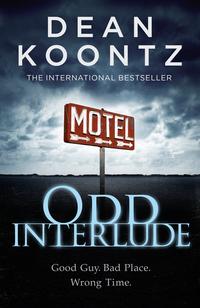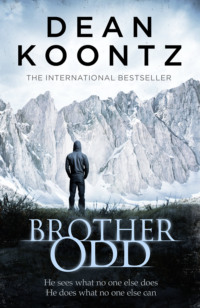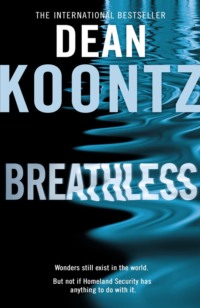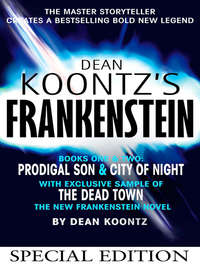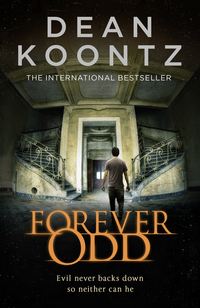
Полная версия
Life Expectancy
Red and black lettering, illustrated with elephants and lions, crowded the face of the circus pass. The reverse was blank. Unfolded, it measured three by five inches, the size of an index card.
As hard rain beat on a nearby window, drumming up a sound like many running feet, Josef clutched again at the railings, anchoring himself, as if he feared that he might float up and away. “Nineteen ninety-four. September fifteenth. A Thursday. Write it down.”
Standing beside the bed, Rudy took dictation, using the precise printing with which he composed recipe cards: SEPT 15, 1994, THURS.
Eyes wide and wild, like those of a rabbit in the thrall of a stalking coyote, Josef stared toward a point high on the wall opposite his bed. He seemed to see more than the wall, something beyond it. Perhaps the future.
“Warn him,” the dying man said. “For God’s sake, warn him.”
Bewildered, Rudy said, “Warn who?”
“Jimmy. Your son, Jimmy, my grandson.”
“He’s not born yet.”
“Almost. Two minutes. Warn him. Nineteen ninety-eight. January nineteenth. A Monday.”
Transfixed by the ghastly expression on his father’s face, Rudy stood with pen poised over paper.
“WRITE IT DOWN!” Josef roared. His mouth contorted so severely in the shout that his dry and peeling lower lip split. A crimson thread slowly unraveled down his chin.
“Nineteen ninety-eight,” Rudy muttered as he wrote.
“January nineteenth,” Josef repeated in a croak, his parched throat having been racked by the shout. “A Monday. Terrible day.”
“Why?”
“Terrible, terrible.”
“Why will it be terrible?” Rudy persisted.
“Two thousand two. December twenty-third. Another Monday.”
Jotting down this third date, Rudy said, “Dad, this is weird. I don’t understand.”
Josef still held tight to both steel bedrails. Suddenly he shook them violently, with such uncanny strength that the railings seemed to be coming apart at their joints, raising a clatter that would have been loud in an ordinary hospital room but that was explosive in the usually hushed intensive care unit.
At first the observing nurse rushed forward, perhaps intending to calm the patient, but the electrifying combination of fury and terror that wrenched his pallid face caused her to hesitate. When waves of thunder broke against the hospital hard enough to shake dust off the acoustic ceiling tiles, the nurse retreated, almost as if she thought Josef himself had summoned that detonation.
“WRITE IT DOWN!” he demanded.
“I wrote, I wrote,” Rudy assured him. “December 23, 2002, another Monday.”
“Two thousand three,” Josef said urgently. “The twenty-sixth of November. A Wednesday. The day before Thanksgiving.”
After recording this fourth date on the back of the circus pass, just as his father stopped shaking the bedrails, Rudy looked up and saw a fresh emotion in Josef’s face, in his eyes. The fury was gone, and the terror.
As tears welled, Josef said, “Poor Jimmy, poor Rudy.”
“Dad?”
“Poor, poor Rudy. Poor Jimmy. Where is Rudy?”
“I’m Rudy, Dad. I’m right here.”
Josef blinked, blinked, and flicked away the tears as yet another emotion gripped him, this one not easy to define. Some would have called it astonishment. Others would have said it was wonder of the pure variety that a baby might express at the first sight of any bright marvel.
After a moment, Rudy recognized it as a state more profound than wonder. This was awe, the complete yielding of the mind to something grand and formidable.
His father’s eyes shone with amazement. Across his face, expressions of delight and apprehension contested with each other.
Josef’s increasingly raspy voice fell to a whisper: “Two thousand five.”
His gaze remained fixed on another reality that apparently he found more convincing than he did this world in which he had lived for fifty-seven years.
Hand trembling now, but still printing legibly, Rudy recorded this fifth date—and waited.
“Ah,” said Joseph, as if a startling secret had been revealed.
“Dad?”
“Not this, not this,” Josef lamented.
“Dad, what’s wrong?”
As curiosity outweighed her anxiety, the rattled nurse ventured closer to the bed.
A doctor entered the cubicle. “What’s going on here?”
Josef said, “Don’t trust the clown.”
The physician looked mildly offended, assuming that the patient had just questioned his medical credentials.
Leaning over the bed, trying to redirect his father’s attention from his otherworldly vision, Rudy said, “Dad, how do you know about the clown?”
“The sixteenth of April,” said Josef.
“How do you know about the clown?”
“WRITE IT DOWN,” Josef thundered even as the heavens crashed against the earth once more.
As the doctor went around to the other side of the bed, Rudy added APRIL 16 after 2005 to the fifth line on the back of the circus pass. He also printed SATURDAY when his father spoke it.
The doctor put a hand under Josef’s chin and turned his head to have a better look at his eyes.
“He isn’t who you think he is,” said Josef, not to the doctor but to his son.
“Who isn’t?” Rudy asked.
“He isn’t.”
“Who’s he?”
“Now, Josef,” the physician chided, “you know me very well. I’m Dr. Pickett.”
“Oh, the tragedy,” Josef said, voice ripe with pity, as if he were not a pastry chef but a thespian upon the Shakespearean stage.
“What tragedy?” Rudy worried.
Producing an ophthalmoscope from a pocket of his white smock, Dr. Pickett disagreed: “No tragedy here. What I see is a remarkable recovery.”
Breaking loose of the physician’s chin grip, increasingly agitated, Josef said, “Kidneys!”
Bewildered, Rudy said, “Kidneys?”
“Why should kidneys be so damned important?” Josef demanded. “It’s absurd, it’s all absurd!”
Rudy felt his heart sink at this, for it seemed that his dad’s brief clarity of mind had begun to give way to babble.
Asserting control of his patient again by once more gripping his chin, Dr. Pickett switched on the ophthalmoscope and directed the light in Josef’s right eye.
As though that narrow beam were a piercing needle and his life were a balloon, Josef Tock let out an explosive breath and slumped back upon his pillow, dead.
With all the techniques and instruments available to a well-equipped hospital, attempts at resuscitation were made, but to no avail. Josef had moved on and wasn’t coming back.
And I, James Henry Tock, arrived. The time on my grandfather’s death certificate matches that on my birth certificate—10:46 P.M.
Bereaved, Rudy understandably lingered at Josef’s bedside. He had not forgotten his wife, but grief immobilized him.
Five minutes later, he received word from a nurse that Maddy had experienced a crisis in her labor and that he must go at once to her side.
Alarmed by the prospect of losing his father and his wife in the same hour, Dad fled the intensive care unit.
As he tells it, the halls of our modest county hospital had become a white labyrinth, and at least twice he made wrong turns. Too impatient to wait for the elevator, he raced down the stairs from the third floor to the ground level before realizing that he’d passed the second floor, on which the maternity ward was located.
Dad arrived in the expectant-fathers’ waiting lounge to the crack of a pistol as Konrad Beezo shot his wife’s doctor.
For an instant, Dad thought Beezo had used a clown gun, some trick firearm that squirted red ink. The doctor dropped to the floor, however, not with comic flair but with hideous finality, and the smell of blood plumed thick, too real.
Beezo turned to Dad and raised the pistol.
In spite of the rumpled porkpie hat and the short-sleeved coat and the bright patch on the seat of his pants, in spite of the white greasepaint and the rouged cheeks, nothing about Konrad Beezo was clownish at that moment. His eyes were those of a jungle cat, and it was easy to imagine that the teeth bared in his snarl were tiger fangs. He loomed, the embodiment of murderous dementia, demonic.
Dad thought that he, too, would be shot, but Beezo said, “Stay out of my way, Rudy Tock. I have no quarrel with you. You’re not an aerialist.”
Beezo shouldered through the door between the lounge and the maternity ward, slammed it shut behind him.
Dad knelt beside the doctor—and discovered that a breath of life remained in him. The wounded man tried to speak, could not. Blood had pooled in his throat, and he gagged.
Gently elevating the physician’s head, shoving old magazines under it to brace the man at an angle that allowed him to breathe, Dad shouted for help as the swelling storm rocked the night with doomsday peals of thunder.
Dr. Ferris MacDonald had been Maddy’s physician. He had also been called upon to treat Natalie Beezo when, unexpectedly, she had been brought to the hospital in labor.
Mortally wounded, he seemed more bewildered than frightened. Able to clear his throat and breathe now, he told my father, “She died during delivery, but it wasn’t my fault.”
For a terrifying moment, my dad thought Maddy had died.
Dr. MacDonald realized this, for his last words were “Not Maddy. The clown’s wife. Maddy … is alive. I’m so sorry, Rudy.”
Ferris MacDonald died with my father’s hand upon his heart.
As the thunder rolled toward a far horizon, Dad heard another gunshot from beyond the door through which Konrad Beezo had vanished.
Maddy lay somewhere behind that door—a woman left helpless by a difficult labor. I was back there, too—an infant who was not yet enough of a lummox to defend himself.
My father, then a baker, had never been a man of action; nor did he become one when, a few years later, he graduated to the status of pastry chef. He is of average height and weight, not physically weak but not born for the boxing ring, either. He had to that point led a charmed life, without serious want, without any strife.
Nevertheless, fear for his wife and his child cast him into a strange, cold panic marked more by calculation than by hysteria. Without a weapon or a plan, but suddenly with the heart of a lion, he opened that door and went after Beezo.
Although his imagination spun a thousand bloody scenarios in mere seconds, he says that he did not anticipate what was about to happen, and of course he could not foresee how the events of that night would reverberate through the next thirty years with such terrible and astonishing consequences in his life and mine.
2
At Snow County Hospital, in the expectant-fathers’ waiting room, the inner door opens to a short corridor with a supply room to the left and a bathroom to the right. Fluorescent ceiling panels, white walls, and a white ceramic-tile floor imply impeccable antibacterial procedures.
I have seen that space because my child entered the world in the same maternity ward on another unforgettable night of incomparable chaos.
On that stormy evening in 1974, with Richard Nixon gone home to California, and Beezo on a rampage, my father found a nurse sprawled in the hallway, shot point-blank.
He remembers almost being driven to his knees by pity, by despair.
The loss of Dr. MacDonald, although terrible, had not fully penetrated Dad, for it had been so sudden, so dreamlike. Mere moments later, the sight of this dead nurse—young, fair, like a fallen angel in white raiments, golden hair fanning in a halo around her eerily serene face—pierced him, and he absorbed the truth and the meaning of both deaths at once.
He tore open the storage-closet door, searching for something he might use as a weapon. He found only spare linens, bottles of antiseptic cleaner, a locked cabinet of medications …
Although in retrospect this moment struck him as darkly comic, at the time he thought, with grave seriousness and with the logic of desperation, that having kneaded so much dough over the past few years, his hands were dangerously strong. If only he could get past Beezo’s gun, he surely would have the strength to strangle him.
No makeshift weapon could hope to be as deadly as the well-flexed hands of an angry baker. Sheer terror spawned this lunatic notion; curiously, however, terror also gave him courage.
The short hallway intersected a longer one, which led left and right. Off this new corridor, three doors served a pair of delivery rooms as well as the neonatal care unit where swaddled newborns, each in his or her bassinet, pondered their new reality of light, shadow, hunger, discontent, and taxes.
Dad sought my mother and me, but found only her. She lay in one of the delivery rooms, alone and unconscious on the birthing bed.
At first he thought that she must be dead. Darkness swooned at the edges of his vision, but before he passed out, he saw that his beloved Maddy was breathing. He clutched the edge of her bed until his vision brightened.
Gray-faced, drenched with sweat, she looked not like the vibrant woman he knew, but instead appeared to be frail and vulnerable.
Blood on the sheets suggested that she’d delivered their child, but no squalling infant was present.
Elsewhere, Beezo shouted, “Where are you bastards?”
Reluctant to leave my mother, Dad nonetheless went in search of the conflict to see what help he could provide—as (he has always insisted) any baker would have done.
In the second delivery room, he found Natalie Beezo upon another birthing bed. The slender aerialist had so recently died from the complications of childbirth that her tears of suffering had not yet dried upon her cheeks.
According to Dad, even after her agony and even in death, she was ethereally beautiful. A flawless olive complexion. Raven hair. Her eyes were open, luminous green, like windows to a field in Heaven.
For Konrad Beezo, who didn’t appear to be handsome under the greasepaint and who was not a man of substantial property and whose personality would surely be at least somewhat off-putting even under ordinary circumstances, this woman was a prize beyond all reasonable expectation. You could understand—though not excuse—his violent reaction to the loss of her.
Stepping out of the delivery room, Dad came face to face with the homicidal clown. Simultaneously Beezo flung open the door from the crèche and charged into the hall, a blanketed infant cradled in the crook of his left arm.
At this close range, the pistol in his right hand appeared to be twice the size that it had been in the waiting room, as if they were in Alice’s Wonderland, where objects grew or shrank with no regard for reason or for the laws of physics.
Dad might have seized Beezo’s wrist and, with his strong baker’s hands, fought for possession of the gun, but he dared not act in any way that would have put the baby at risk.
With its pinched red face and furrowed brow, the infant appeared indignant, offended. Its mouth stretched open wide, as though it were trying to scream but had been shocked silent by the realization that its father was a mad clown.
Thank God for the baby, Dad has often said. Otherwise I would have gotten myself killed. You’d have grown up fatherless, and you’d never have learned how to make a first-rate crème brûlée.
So cradling the baby and brandishing the pistol, Beezo demanded of my father, “Where are they, Rudy Tock?”
“Where are who?” Dad asked.
The red-eyed clown appeared to be both wrung by grief and ripped by anger. Tears streaked his makeup. His lips trembled as if he might sob uncontrollably, then skinned back from his teeth in an expression of such ferocity that a chill wound through Dad’s bowels.
“Don’t play dumb,” Beezo warned. “There had to be other nurses, maybe another doctor. I want the bastards dead, all of them who failed her.”
“They ran,” my father said, certain that it would be safer to lie about having seen the medical staff escape than to insist that he had encountered no one. “They slipped out behind your back, the way you came, through the waiting room. They’re long gone.”
Feeding on his rage, Konrad Beezo appeared to swell larger, as if anger were the food of giants. No Barnum & Bailey buffoonery brightened his face, and the poisonous hatred in his eyes was as potent as cobra venom.
Lest he become a stand-in for the medical staff no longer within Beezo’s reach, Dad quickly added, with no trace of threat, as if only being helpful, “Police are on the way. They’ll want to take the baby from you.”
“My son is mine,” Beezo declared with such passion that the stink of stale cigarette smoke rising from his clothes might almost have been mistaken for the consequence of his fiery emotion. “I will do anything to keep him from being raised by the aerialists.”
Walking a thin line between clever manipulation and obvious fawning in the interest of self-preservation, my father said, “Your boy will be the greatest of his kind—clown, jester, harlequin, jackmuffin.”
“Jackpudding,” the killer corrected, but without animosity. “Yes, he’ll be the greatest. He will. I won’t let anyone deny my son his destiny.”
With baby and pistol, Beezo pushed past my dad and hurried along the shorter hall, where he stepped over the dead nurse with no more concern for her than he’d have shown for a janitor’s mop and bucket.
Feverishly trying to think of something that he could do to bring down this brute without harming the infant, Dad could only watch in frustration. When Beezo reached the door to the expectant-fathers’ lounge, he hesitated, glanced back. “I’ll never forget you, Rudy Tock. Never.”
My father could not decide whether that declaration might be an expression of misguided sentimental affection—or a threat.
Beezo pushed through the door and disappeared.
At once, Dad hurried back to the first delivery room because his primary concern understandably remained with my mother and me.
Still unattended, my mother lay on the birthing bed where Dad had moments ago discovered her. Though still gray-faced and soaked with sweat, she had regained consciousness.
She groaned with pain, blinked in confusion.
Whether she was merely disoriented or delirious is a matter of contention between my parents, but my father insists that he feared for her when she said, “If you want Reuben sandwiches for dinner, we’ll have to go to the market for cheese.”
Mom insists that she actually said, “After this, don’t think you’re ever going to touch me again, you son of a bitch.”
Their love is deeper than desire, than affection, than respect, so deep that its wellspring is humor. Humor is a petal on the flower of hope, and hope blossoms on the vine of faith. They have faith in each other and faith that life has meaning, and from this faith comes their indefatigable good humor, which is their greatest gift to each other—and to me.
I grew up in a home filled with laughter. Regardless of what happens to me in the days ahead, I will have had the laughter. And wonderful pastries.
In this account of my life, I will resort at every turn to amusement, for laughter is the perfect medicine for the tortured heart, the balm for misery, but I will not beguile you. I will not use laughter as a curtain to spare you the sight of horror and despair. We will laugh together, but sometimes the laughter will hurt.
So …
Whether my mother was delirious or sound of mind, whether she blamed my father for the pain of labor or discussed the need for cheese, they are in relative agreement about what happened next. My father found a wall-mounted phone near the door and called for help.
Because this device was more an intercom than a phone, it did not have a standard keypad, just four keys, each clearly labeled: STAFFING, PHARMACY, MAINTENANCE, SECURITY.
Dad pressed SECURITY and informed the answering officer that people had been shot, that the assailant, costumed as a clown, was even then fleeing the building, and that Maddy needed immediate medical assistance.
From the bed, clearheaded now if she had not been previously, my mother cried out, “Where’s my baby?”
Phone still to his ear, my father turned to her, astounded, alarmed. “You don’t know where it is?”
Striving unsuccessfully to sit up, grimacing with pain, Mom said, “How would I know? I passed out or something. What do you mean someone was shot? For God’s sake, who was shot? What’s happening? Where’s my baby?”
Although the delivery room had no windows, although it was surrounded by hallways and by other rooms that further insulated it from the outside world, my folks heard faint sirens rising in the distance.
Dad’s memory regurgitated the suddenly nauseating image of Beezo in the hallway, the pistol in his right hand, the baby cradled in his left arm. Bitter acid burned in my father’s throat, and his already harried heart raced faster.
Perhaps Beezo’s wife and child had died at birth. Perhaps the infant in his arms hadn’t been his own but had been instead little James—or Jennifer—Tock.
I thought “kidnapped,” Dad says when he recalls the moment. I thought about the Lindbergh baby and Frank Sinatra Junior being held for ransom and Rumpelstiltskin and Tarzan being raised by apes, and though none of that makes sense, I thought it all in an instant. I wanted to scream, but I couldn’t, and I felt just like that red-faced baby with its mouth open but silent, and when I thought of the baby, oh, then I just knew it had been you, not his at all, but you, my Jimmy.
Desperate now to find Beezo and stop him, Dad dropped the phone, bolted toward the open door to the hallway—and nearly collided with Charlene Coleman, a nurse who came bearing a baby in her arms.
This infant had a broader face than the one Beezo had spirited into the stormy night. Its complexion was a healthy pink instead of mottled red. According to Dad, its eyes shone clear and blue, and its face glowed with wonder.
“I hid with your baby,” Charlene Coleman said. “I hid from that awful man. I knew he would be trouble when he first showed up with his wife, him wearing that ugly hat indoors and making no apology for it.”
I wish I could verify from personal experience that, indeed, what alarmed Charlene from the get-go was not Beezo’s clown makeup, not his poisonous ranting about his aerialist in-laws, not his eyes so crazy that they almost spun like pinwheels, but simply his hat. Unfortunately, less than one hour old, I had not yet learned English and had not even sorted out who all these people were.
3
Trembling with relief, Dad took me from Charlene Coleman and carried me to my mother.
After the nurse raised the head of the birthing bed and provided more pillows, Mom was able to take me in her arms.
Dad swears that her first words to me were these: “You better have been worth all the pain, Little Blue Eyes,’ cause if you turn out to be an ungrateful child, I’ll make your life a living hell.”
Tearful, shaken by all that had occurred, Charlene recounted recent events and explained how she’d been able to spirit me to safety when the shooting started.
Unexpectedly required to attend two women simultaneously in urgent and difficult labor, Dr. MacDonald had been unable at that hour to locate a qualified physician to assist on a timely basis. He divided his attention between the two patients, hurrying from one delivery room to the other, relying on his nurses for backup, his work complicated by the periodically dimming lights and worry about whether the hospital generator would kick in reliably if the storm knocked out electric service.
Natalie Beezo had received no prenatal care. She unknowingly suffered from preeclampsia. During labor she developed full-blown eclampsia and experienced violent convulsions that would not respond to treatment and that threatened not only her own life but the life of her unborn child.


